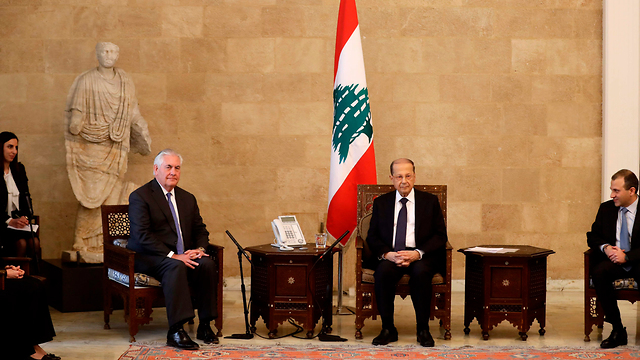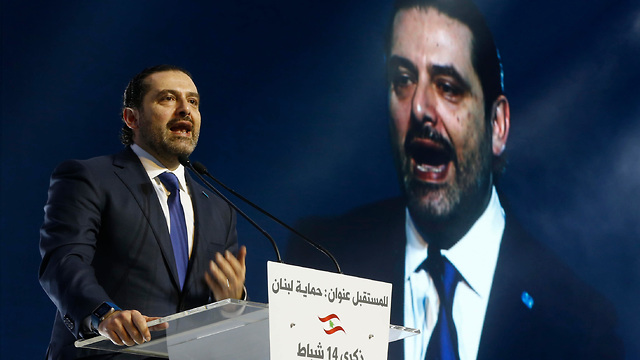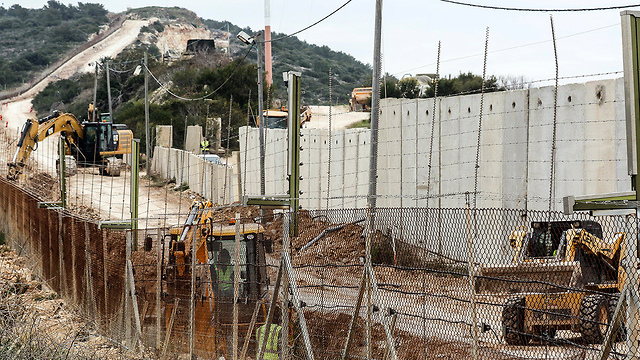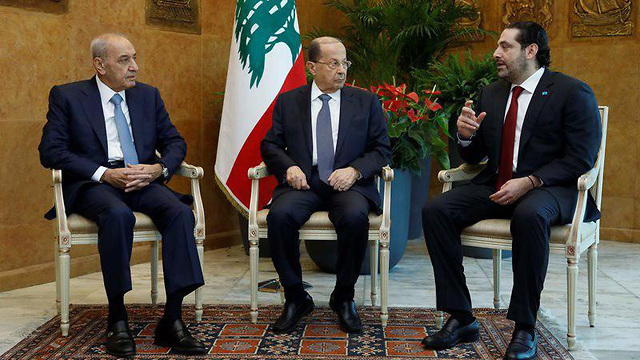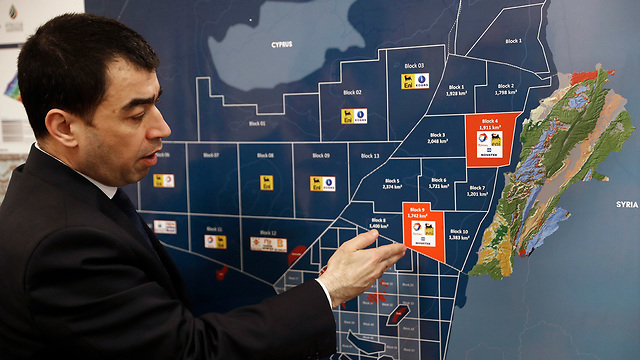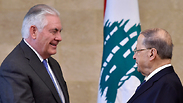

Tillerson in Beirut wades into Lebanon-Israel border dispute, Hezbollah
US Sec. State Rex Tillerson says growing Hezbollah arsenal a threat to Lebanon, US committed to ensure calm on border with Israel; Tillerson met with PM Saad Hariri as well as with key Hezbollah allies: President Michel Aoun, FM Gibran Bassil, Parliament Speaker Nabih Berri.
US Secretary of State Rex Tillerson said on Thursday that Lebanon's security was threatened by the growing arsenal of Iran-backed group Hezbollah and its involvement in regional conflicts.
Speaking alongside Lebanese Prime Minister Saad al-Hariri in a Beirut news conference, Tillerson also said the United States was engaging with Lebanon and Israel to ensure the border remained calm.
Tillerson urged Lebanese leaders to uphold the country's commitment to staying out of regional conflicts, a reference to Hezbollah's role in wars around the Middle East including in neighboring Syria where Iran also holds major sway.
Israel has accused Iran of seeking to set up weapons factories in Lebanon, and the Israeli military last month said the country had turned into one "large missile factory".
Lebanon is a big recipient of US military support. Tillerson said Washington remained committed to supporting the Lebanese army and internal security forces.
The secretary of state also added he had positive discussions in Lebanon on how to break a "stalemate" with Israel over gas drilling rights along the countries' disputed maritime border and maintain calm along the volatile frontier.
Tillerson was in Lebanon on a brief stopover amid a growing dispute between Lebanon and its southern neighbor, Israel, over oil and gas reserves, and Israel's construction of a border wall that Lebanon says encroaches on its territory. The US has been trying to mediate in the dispute, and Tillerson suggested Israel should stop building a border wall until the border between the two countries is agreed on.
"We've asked no one to give up anything. Rather, we're looking for a solution," Tillerson told reporters at his joint press conference with Prime Minister Hariri.
He also called on Hezbollah to cease its activities abroad to help reduce tensions in the region.
"Hezbollah's presence in Syria has only perpetuated the bloodshed, increased the displacement of innocent people and propped up the barbaric (Syrian President Bashar) Assad regime," Tillerson said at the news conference with Hariri, a western ally whose coalition government includes the group.
"Their presence in Iraq and Yemen has also fueled violence. And the consequences of Hezbollah's involvement in these far-off conflicts—which have nothing to do with Lebanon—are felt here."
Earlier on Thursday, Tillerson met with key allies of Hezbollah, including President Michel Aoun, Foreign Minister Gibran Bassil and Parliament Speaker Nabih Berri.
Aoun, who kept Tillerson waiting for several minutes at the palace ahead of their meeting, said he asked Tillerson to work on preventing what he said were ongoing Israeli violations of Lebanese sovereignty and said Lebanon rejects Israeli claims over parts of the countries' maritime border.
The Lebanese presidency denied there was any departure from protocol and Rafik Chalala, who heads Aoun's media office, said Tillerson had arrived a few minutes earlier than expected and that the meeting began on time. He pointed to Tillerson's comments he left in the guest book in which he thanked the presidency for the "warm welcome."
At his meeting with Berri, a pro-Hezbollah politician, one of the photographers asked the men to shake hands. Berri laughed and said: "Why do you need that?"
They then looked at each other, chuckled and obliged.
Tillerson, who arrived in Beirut from neighboring Jordan, is the most senior official from the Trump administration to visit Lebanon and the first by a US secretary of state in four years.
Israel has recently escalated its threats over Lebanon's invitation for offshore gas exploration bids along the countries' maritime border claiming that Lebanon will be drilling in areas owned by Israel. Lebanese officials deny the Israeli statements, saying the area where the country plans to drill belongs to Lebanon.
The long-standing dispute resurfaced recently as Lebanon signed a deal with an international consortium to start exploratory offshore drilling next year.
Israeli Defense Minister Avigdor Lieberman described the exploration tender as "provocative" and suggested Lebanon had put out invitations for bids from international groups for a gas field "which is by all accounts ours."
His comments drew sharp condemnation from Hezbollah, as well as Lebanese officials, including Hariri.
"What is ours is ours and what is Israel's is Israel's. We are trying to find solutions that will be fair to us and fair to everyone," Hariri said at Thursday's news conference.
There are over 800 square kilometers (300 square miles) of waters claimed by the two countries. US officials have previously tried to mediate the dispute, including most recently by David Satterfield, the US acting assistance secretary of state who visited the border area in south Lebanon last week, and was accompanying Tillerson on Thursday.
Tillerson, during his short visit, also reinforced support for Lebanon's government headed by Hariri and for the Lebanese armed forces.
The visit comes amid a new US effort to squeeze Iran with sanctions against Hezbollah and the Trump administration is hitting Hezbollah's financial network with new penalties as part of its efforts to limit Iran's influence throughout the region.
The Associated Press and Reuters contributed to this report.














